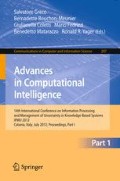Abstract
This paper introduces a fuzzy inclusion indicator derived from a connective aimed at modulating a fuzzy criterion according to the satisfaction of another one. The idea is to express that one is all the more demanding as to the degree attached to an element x in a set B as this element has a high degree of membership degree to a set A. The use of this reinforced inclusion indicator is illustrated in the context of database querying.
Access this chapter
Tax calculation will be finalised at checkout
Purchases are for personal use only
Preview
Unable to display preview. Download preview PDF.
References
Bosc, P., Pivert, O.: About approximate inclusion and its axiomatization. Fuzzy Sets and Systems 157(11), 1438–1454 (2006)
Bosc, P., Pivert, O.: On two qualitative approaches to tolerant inclusion operators. Fuzzy Sets and Systems 159(21), 2786–2805 (2008)
Bosc, P., Pivert, O.: On a strengthening connective for flexible database querying. In: Proc. of the 20th IEEE International Conference on Fuzzy Systems (FUZZ-IEEE 2011), Taiwan (2011)
Bosc, P., Pivert, O.: SQLf: a relational database language for fuzzy querying. IEEE Transactions on Fuzzy Systems 3, 1–17 (1995)
Bosc, P., Buckles, B., Petry, F., Pivert, O.: Fuzzy databases. In: Bezdek, J., Dubois, D., Prade, H. (eds.) Fuzzy Sets in Approximate Reasoning and Information Systems, The Handbook of Fuzzy Sets Series, pp. 403–468. Kluwer Academic Publishers, Dordrecht (1999)
Bosc, P., Pivert, O.: On four noncommutative fuzzy connectives and their axiomatization. Fuzzy Sets and Systems (2012)
Bouchon-Meunier, B., Laurent, A., Lesot, M.-J., Rifqi, M.: Strengthening fuzzy gradual rules through ”all the more” clauses. In: Proc. of FUZZ-IEEE 2010, pp. 1–7. IEEE (2010)
MacVicar-Whelan, P.J.: Fuzzy sets, the concept of height and the hedge very. IEEE Transactions on Systems, Man, and Cybernetics 8, 507–511 (1978)
Bouchon-Meunier, B., Yao, J.: Linguistic modifiers and imprecise categories. International Journal of Intelligent Systems 7, 25–36 (1992)
Bosc, P., Dubois, D., HadjAli, A., Pivert, O., Prade, H.: Adjusting the core and/or the support of a fuzzy set - a new approach to fuzzy modifiers. In: FUZZ-IEEE, pp. 1–6. IEEE (2007)
Bouchon-Meunier, B., Dubois, D., Godo, L., Prade, H.: Fuzzy sets and possibility theory in approximate and plausible reasoning. In: Bezdek, J.C., Dubois, D., Prade, H. (eds.) Fuzzy Sets in Approximate Reasoning and Information Systems, pp. 15–190. Kluwer Academic Publishers (1999)
Fodor, J., Yager, R.R.: Fuzzy-set theoretic operators and quantifiers. In: Dubois, D., Prade, H. (eds.) The Handbooks of Fuzzy Sets Series, vol. 1: Fundamentals of Fuzzy Sets, pp. 125–193. Kluwer Academic Publishers, Dordrecht (2000)
Yager, R.R.: An approach to inference in approximate reasoning. International Journal of Man-Machine Studies 13(3), 323–338 (1980)
Bandler, W., Kohout, L.: Fuzzy power sets and fuzzy implication operators. Fuzzy Sets and Systems 4, 13–30 (1980)
Sinha, D., Dougherty, E.R.: Fuzzification of set inclusion: theory and applications. Fuzzy Sets and Systems 55, 15–42 (1993)
Kitainik, L.: Fuzzy implication and fuzzy inclusion: a comparative axiomatic study. In: Lowen, R., Roubens, M. (eds.) Fuzzy Logic — State of the Art, pp. 441–451. Kluwer Academic Publishers, Dordrecht (1993)
Türksen, I.B., Kreinovich, V., Yager, R.R.: A new class of fuzzy implications. Axioms of fuzzy implication revisited. Fuzzy Sets and Systems 100, 267–272 (1998)
Cornelis, C., van der Donck, C., Kerre, E.: Sinha-Dougherty approach to the fuzzification of set inclusion revisited. Fuzzy Sets and Systems 134, 283–296 (2003)
Bosc, P., Legrand, C., Pivert, O.: About fuzzy query processing — the example of the division. In: Proc. of the 8th IEEE International Conference on Fuzzy Systems (FUZZ-IEEE 1999), Seoul, Korea, pp. 592–597 (1999)
Author information
Authors and Affiliations
Editor information
Editors and Affiliations
Rights and permissions
Copyright information
© 2012 Springer-Verlag Berlin Heidelberg
About this paper
Cite this paper
Bosc, P., Pivert, O. (2012). On a Reinforced Fuzzy Inclusion and Its Application to Database Querying. In: Greco, S., Bouchon-Meunier, B., Coletti, G., Fedrizzi, M., Matarazzo, B., Yager, R.R. (eds) Advances on Computational Intelligence. IPMU 2012. Communications in Computer and Information Science, vol 297. Springer, Berlin, Heidelberg. https://doi.org/10.1007/978-3-642-31709-5_36
Download citation
DOI: https://doi.org/10.1007/978-3-642-31709-5_36
Publisher Name: Springer, Berlin, Heidelberg
Print ISBN: 978-3-642-31708-8
Online ISBN: 978-3-642-31709-5
eBook Packages: Computer ScienceComputer Science (R0)

